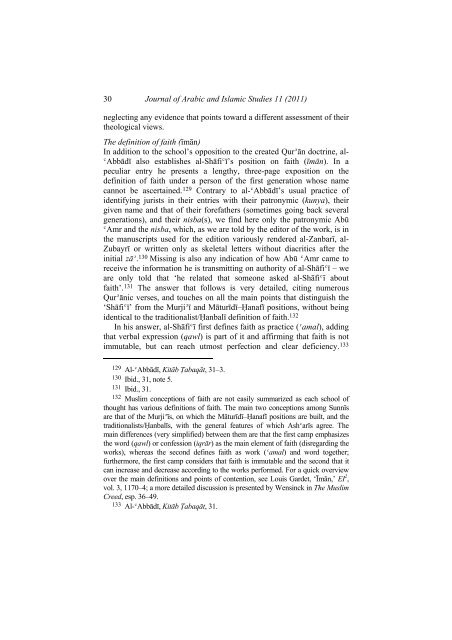JOURNAL OF ARABIC AND ISLAMIC STUDIES
JOURNAL OF ARABIC AND ISLAMIC STUDIES
JOURNAL OF ARABIC AND ISLAMIC STUDIES
You also want an ePaper? Increase the reach of your titles
YUMPU automatically turns print PDFs into web optimized ePapers that Google loves.
30<br />
Journal of Arabic and Islamic Studies 11 (2011)<br />
neglecting any evidence that points toward a different assessment of their<br />
theological views.<br />
The definition of faith (īmān)<br />
In addition to the school’s opposition to the created Qurʾān doctrine, al-<br />
ʿAbbādī also establishes al-Shāfiʿī’s position on faith (īmān). In a<br />
peculiar entry he presents a lengthy, three-page exposition on the<br />
definition of faith under a person of the first generation whose name<br />
cannot be ascertained. 129 Contrary to al-ʿAbbādī’s usual practice of<br />
identifying jurists in their entries with their patronymic (kunya), their<br />
given name and that of their forefathers (sometimes going back several<br />
generations), and their nisba(s), we find here only the patronymic Abū<br />
ʿAmr and the nisba, which, as we are told by the editor of the work, is in<br />
the manuscripts used for the edition variously rendered al-Zanbarī, al-<br />
Zubayrī or written only as skeletal letters without diacritics after the<br />
initial zāʾ. 130 Missing is also any indication of how Abū ʿAmr came to<br />
receive the information he is transmitting on authority of al-Shāfiʿī – we<br />
are only told that ‘he related that someone asked al-Shāfiʿī about<br />
faith’. 131 The answer that follows is very detailed, citing numerous<br />
Qurʾānic verses, and touches on all the main points that distinguish the<br />
‘Shāfiʿī’ from the Murjiʾī and Māturīdī–Ḥanafī positions, without being<br />
identical to the traditionalist/Ḥanbalī definition of faith. 132<br />
In his answer, al-Shāfiʿī first defines faith as practice (ʿamal), adding<br />
that verbal expression (qawl) is part of it and affirming that faith is not<br />
immutable, but can reach utmost perfection and clear deficiency. 133<br />
129 Al-ʿAbbādī, Kitāb Ṭabaqāt, 31–3.<br />
130 Ibid., 31, note 5.<br />
131 Ibid., 31.<br />
132 Muslim conceptions of faith are not easily summarized as each school of<br />
thought has various definitions of faith. The main two conceptions among Sunnīs<br />
are that of the Murjiʾīs, on which the Māturīdī–Ḥanafī positions are built, and the<br />
traditionalists/Ḥanbalīs, with the general features of which Ashʿarīs agree. The<br />
main differences (very simplified) between them are that the first camp emphasizes<br />
the word (qawl) or confession (iqrār) as the main element of faith (disregarding the<br />
works), whereas the second defines faith as work (ʿamal) and word together;<br />
furthermore, the first camp considers that faith is immutable and the second that it<br />
can increase and decrease according to the works performed. For a quick overview<br />
over the main definitions and points of contention, see Louis Gardet, ‘Īmān,’ EI 2 ,<br />
vol. 3, 1170–4; a more detailed discussion is presented by Wensinck in The Muslim<br />
Creed, esp. 36–49.<br />
133 Al-ʿAbbādī, Kitāb Ṭabaqāt, 31.

















